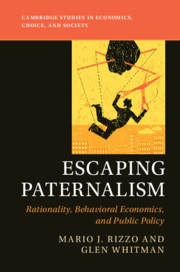Book contents
- Escaping Paternalism
- Cambridge Studies in Economics, Choice, and Society
- Escaping Paternalism
- Copyright page
- Contents
- Figures
- Tables
- Preface
- 1 Introduction
- 2 What Is Rationality?
- 3 Rationality for Puppets
- 4 Preference Biases
- 5 The Rationality of Beliefs
- 6 Deficient Foundations for Behavioral Policymaking
- 7 Knowledge Problems in Paternalist Policymaking
- 8 The Political Economy of Paternalist Policymaking
- 9 Slippery Slopes in Paternalist Policymaking
- 10 Common Threads, Escape Routes, and Paths Forward
- References
- Index
10 - Common Threads, Escape Routes, and Paths Forward
Published online by Cambridge University Press: 02 December 2019
- Escaping Paternalism
- Cambridge Studies in Economics, Choice, and Society
- Escaping Paternalism
- Copyright page
- Contents
- Figures
- Tables
- Preface
- 1 Introduction
- 2 What Is Rationality?
- 3 Rationality for Puppets
- 4 Preference Biases
- 5 The Rationality of Beliefs
- 6 Deficient Foundations for Behavioral Policymaking
- 7 Knowledge Problems in Paternalist Policymaking
- 8 The Political Economy of Paternalist Policymaking
- 9 Slippery Slopes in Paternalist Policymaking
- 10 Common Threads, Escape Routes, and Paths Forward
- References
- Index
Summary
We summarize the arguments against behavioral paternalism laid out in the preceding chapters. Common threads that unify these lines of argument include: the complexity of inclusive rationality, the indeterminacy of paternalistic welfare criteria, the role of incentives and learning, and the rush to policy. We then consider a range of “escape routes” or defenses of behavioral paternalism, including: reverting to objective-welfare paternalism, appealing to obviousness, shifting the burden of proof, loosening the definition of paternalism, relying on the “libertarian condition,” invoking the inevitability of choice architecture, focusing on the irrational subset of the population, relying on extreme cases, treating behavioral paternalism as a toolbox, and invoking fiscal externalities. We conclude with a series of recommendations: replacing neoclassical (puppet) rationality with inclusive rationality, rejecting the paternalism-generating framework, having reasonable expectations of policymakers, and maintaining important distinctions such as public vs. private and coercive vs. voluntary interventions.
Keywords
- Type
- Chapter
- Information
- Escaping PaternalismRationality, Behavioral Economics, and Public Policy, pp. 398 - 440Publisher: Cambridge University PressPrint publication year: 2019



